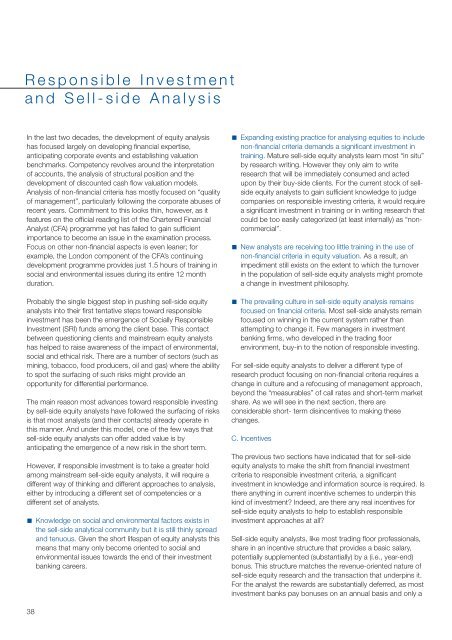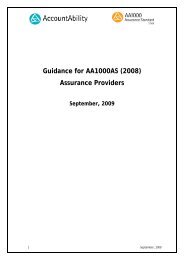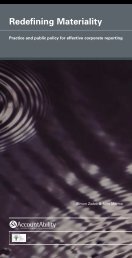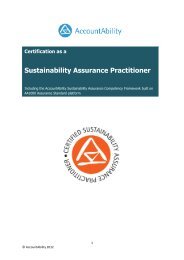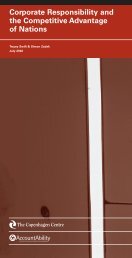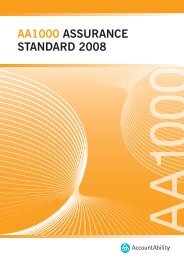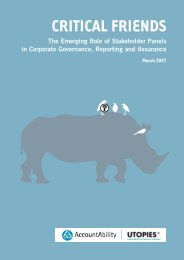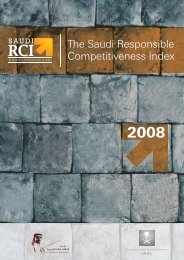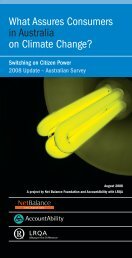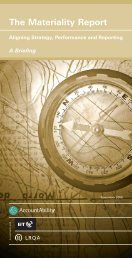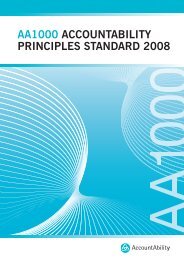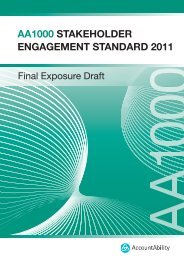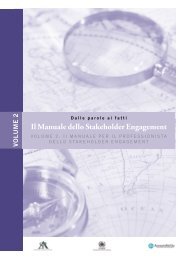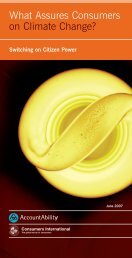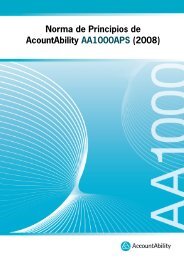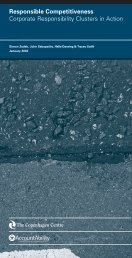Mainstreaming Responsible Investment - AccountAbility
Mainstreaming Responsible Investment - AccountAbility
Mainstreaming Responsible Investment - AccountAbility
Create successful ePaper yourself
Turn your PDF publications into a flip-book with our unique Google optimized e-Paper software.
<strong>Responsible</strong> <strong>Investment</strong><br />
and Sell-side Analysis<br />
In the last two decades, the development of equity analysis<br />
has focused largely on developing financial expertise,<br />
anticipating corporate events and establishing valuation<br />
benchmarks. Competency revolves around the interpretation<br />
of accounts, the analysis of structural position and the<br />
development of discounted cash flow valuation models.<br />
Analysis of non-financial criteria has mostly focused on “quality<br />
of management”, particularly following the corporate abuses of<br />
recent years. Commitment to this looks thin, however, as it<br />
features on the official reading list of the Chartered Financial<br />
Analyst (CFA) programme yet has failed to gain sufficient<br />
importance to become an issue in the examination process.<br />
Focus on other non-financial aspects is even leaner; for<br />
example, the London component of the CFA’s continuing<br />
development programme provides just 1.5 hours of training in<br />
social and environmental issues during its entire 12 month<br />
duration.<br />
Probably the single biggest step in pushing sell-side equity<br />
analysts into their first tentative steps toward responsible<br />
investment has been the emergence of Socially <strong>Responsible</strong><br />
<strong>Investment</strong> (SRI) funds among the client base. This contact<br />
between questioning clients and mainstream equity analysts<br />
has helped to raise awareness of the impact of environmental,<br />
social and ethical risk. There are a number of sectors (such as<br />
mining, tobacco, food producers, oil and gas) where the ability<br />
to spot the surfacing of such risks might provide an<br />
opportunity for differential performance.<br />
The main reason most advances toward responsible investing<br />
by sell-side equity analysts have followed the surfacing of risks<br />
is that most analysts (and their contacts) already operate in<br />
this manner. And under this model, one of the few ways that<br />
sell-side equity analysts can offer added value is by<br />
anticipating the emergence of a new risk in the short term.<br />
However, if responsible investment is to take a greater hold<br />
among mainstream sell-side equity analysts, it will require a<br />
different way of thinking and different approaches to analysis,<br />
either by introducing a different set of competencies or a<br />
different set of analysts.<br />
Knowledge on social and environmental factors exists in<br />
the sell-side analytical community but it is still thinly spread<br />
and tenuous. Given the short lifespan of equity analysts this<br />
means that many only become oriented to social and<br />
environmental issues towards the end of their investment<br />
banking careers.<br />
Expanding existing practice for analysing equities to include<br />
non-financial criteria demands a significant investment in<br />
training. Mature sell-side equity analysts learn most “in situ”<br />
by research writing. However they only aim to write<br />
research that will be immediately consumed and acted<br />
upon by their buy-side clients. For the current stock of sellside<br />
equity analysts to gain sufficient knowledge to judge<br />
companies on responsible investing criteria, it would require<br />
a significant investment in training or in writing research that<br />
could be too easily categorized (at least internally) as “noncommercial”.<br />
New analysts are receiving too little training in the use of<br />
non-financial criteria in equity valuation. As a result, an<br />
impediment still exists on the extent to which the turnover<br />
in the population of sell-side equity analysts might promote<br />
a change in investment philosophy.<br />
The prevailing culture in sell-side equity analysis remains<br />
focused on financial criteria. Most sell-side analysts remain<br />
focused on winning in the current system rather than<br />
attempting to change it. Few managers in investment<br />
banking firms, who developed in the trading floor<br />
environment, buy-in to the notion of responsible investing.<br />
For sell-side equity analysts to deliver a different type of<br />
research product focusing on non-financial criteria requires a<br />
change in culture and a refocusing of management approach,<br />
beyond the “measurables” of call rates and short-term market<br />
share. As we will see in the next section, there are<br />
considerable short- term disincentives to making these<br />
changes.<br />
C. Incentives<br />
The previous two sections have indicated that for sell-side<br />
equity analysts to make the shift from financial investment<br />
criteria to responsible investment criteria, a significant<br />
investment in knowledge and information source is required. Is<br />
there anything in current incentive schemes to underpin this<br />
kind of investment Indeed, are there any real incentives for<br />
sell-side equity analysts to help to establish responsible<br />
investment approaches at all<br />
Sell-side equity analysts, like most trading floor professionals,<br />
share in an incentive structure that provides a basic salary,<br />
potentially supplemented (substantially) by a (i.e., year-end)<br />
bonus. This structure matches the revenue-oriented nature of<br />
sell-side equity research and the transaction that underpins it.<br />
For the analyst the rewards are substantially deferred, as most<br />
investment banks pay bonuses on an annual basis and only a<br />
38


